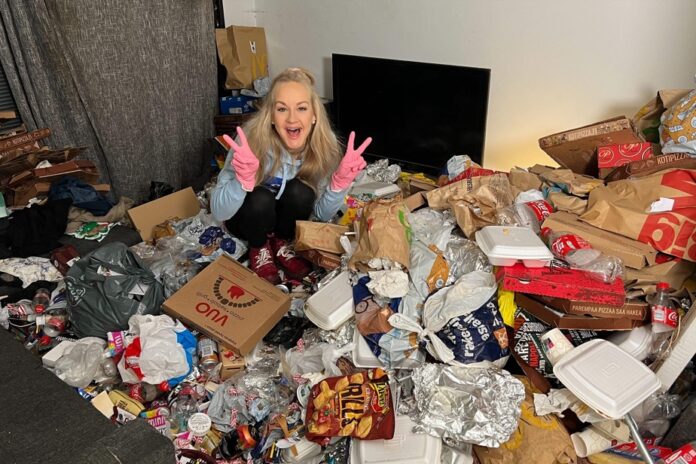(Helsinki) “I love to clean, I love dirt”: On social media, “cleanfluencers” like Auri Kananen give their millions of followers advice on how to turn a hovel into an immaculate palace.
Tidying up queen Marie Kondo may have put her career on hold, but her succession is assured.
Tackling a huge pile of rubbish in a Helsinki apartment, Auri, 28, from Finland, pulls out a slice of old, bug-swarming pizza, which she shows to the camera in her other hand.
With a smile on her lips and long blond hair, the young woman travels the planet in search of “the dirtiest houses”.
“I remember when I had 19 subscribers. Even then, I thought it was great that 19 strangers wanted to watch me clean,” recalls the “cleanfluencer”, now one of the most famous in the world.
In her cheerful videos, she dusts, scrubs and sorts against the backdrop of pop music, outfitted in bright pink rubber gloves, her signature gear.
In this Helsinki apartment, the floor is so strewn with rotting food and trash that walking is nearly impossible.
“Usually the occupants suffer from mental health problems or have experienced a tragedy,” the young Finn told AFP.
Here, a young man whose brother is subject to multiple sclerosis and who himself suffers from depression.
Miserable living conditions that the Finn understands since she too experienced a period of depression.
In the comments to her videos, her followers thank Auri for helping them, praising the fact that she doesn’t judge those in distress.
Popularized with the rise of Tiktok, cleaning videos have become popular on social media in recent years, with a growing number of users inspired enough to post their own content.
The subscribers ? Mostly young millennials and women, as well as people who find it hard to motivate themselves to clean.
Under her alias of “Cleanwithabbi” (two million subscribers), Abigail is one of those ultra-popular cleaners.
The 27-year-old single mother of two – who prefers to keep her full name withheld for family reasons – films herself in her red brick home in Huyton, Liverpool.
“I was watching videos and I was like, ‘this is what I do at home, so I just have to film myself,'” she recalls.
Because her youngest son, Billy, has potential sensory processing disorder, cleaning has always been a big part of his life.
“He really cares about his routine and keeping everything clean,” she explains.
“It relaxes me, it’s like therapy,” Abbi told AFP. “It allows me to escape from my everyday life and the worries and stresses that come with it.”
His videos are now a source of income. Sponsored by brands whose products she uses, she earns between 720 and 1200 dollars per clip.
His motivation? That “people recognize themselves in the situation, especially that of a mother of two children”.
400 miles south, Ann Russel approaches TikTok videos differently.
Sitting comfortably on her sofa by the fireplace, the 59-year-old housekeeper answers questions from her subscribers, holding her phone at face level.
To remove marker marks from a wooden table without touching the varnish, she advises isopropyl alcohol: “Dip a cotton swab in it and rub gently.”
“If nobody explains it to you, how are you supposed to know what to do?” “, she says.
Every day, Ann produces between 4 and 12 videos, answering questions from her 2.3 million subscribers without frills.
“I turn on my phone, and I talk to him. That’s all. It’s the best I can do. I’m not very good at it,” she laughs.
According to Ann, the feeling of “satisfaction” provided by the cleaning videos could explain their success.
The Japanese high priestess of tidying up, Marie Kondo, made headlines at the end of January when she announced that cleanliness was no longer her priority. But his heirs want to take up the torch.
“Washing your socks, making the pairs and putting them back in the drawer feels like you’ve done a good job,” says Ann Russell.
“It gives people a sense of control. Because they are in control of their personal life, they feel better about the outside world,” she says.








